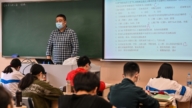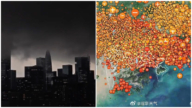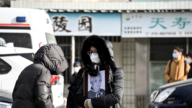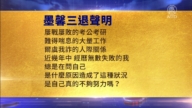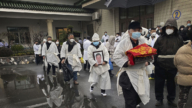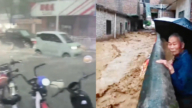【新唐人2014年09月12日訊】大陸的「教師節」剛剛過去,媒體上爆出教育領域的不公平現象,也越來越多。例如:學生是否能上好學校,取決於父母的社會地位與金錢。另外,各地有不少教師,在抗議中度過了「教師節」。顯示出目前的教育體系,也給教師帶來不少困惑。古人說:「師者,所以傳道、受業、解惑也。」當學生和教師都處於困惑中,誰能解惑?又如何認識這些亂象呢?請聽專家學者們的解讀。
哈佛大學在讀碩士高雨莘,在大陸「教師節」前夕發表文章,題目是《中國日漸擴大的教育不平等》。文章揭示,北京當局「造就了一個欺貧凌弱的體制:以官僚阻撓和收入門檻拖纍著社會下層力爭上游的步伐」。高官、富商,還是農民工,父母的地位和金錢越來越明顯的決定了兒女們受教育的機會。
原北京大學副教授焦國標對教育界的這些現象有一定了解,他介紹,現在大陸好一點的學校,普遍留給金錢很大的空間。比如說:一個好學校每年能招1000個學生,其中真正按分數招來的,可能只有200人,剩下的800個名額,學校就要求交各種贊助費等。
原北京大學副教授焦國標:「那有錢的,他就可以拿些錢,然後他們的孩子就分數少一點,也可以進這樣的學校。那有的家庭的孩子,分數考得很好,但是沒有進入比如說前200名的分數,那他家沒有錢,他就不能上比較好的學校。根源是它設定了這樣一個門檻。」
高雨莘還在文章中回憶說,自己母親就讀北京大學時,同學的家庭背景完全不同。然而,在接下來的幾十年裡,經濟開放不僅帶來了巨額財富,還帶來了收入不均,這些都讓中國頂尖高校圈子裡的多樣性近乎蕩然無存。
台灣心理學博士、教育專家陳彥玲:「它跟整個社會的價值觀有關係的,你看『文化大革命』的時候,它可以讓一個人去打自己的老師。尤其對教師這個領域,它現在講究的是『速成』,教育它是『循序漸進』,還要『有教無類』,他不能去挑學生的。」
台灣心理學博士、教育專家陳彥玲表示,大陸當局對傳統文化和理念的系統性破壞,造成教育體系急功近利,教師也無法遵循「有教無類」的教育原則。
陳彥玲:「如果他不是用他的理想、他的精神、他的熱忱,去付出,那他一定要得到回來錢,因為他看重的是錢。如果今天它整個的社會已經變得,1000個人其中有800個人是用錢可以買的,這絕對不是教育的本質。」
陳彥玲介紹,在台灣,「教師節」是孔子的生日——9月28號。台灣設立「教師節」就是用孔子的生日提醒所有的教師,要堅持正確的教育理念。
焦國標指出,這種不公平的現像在大陸普遍存在,是因為當局的整個理念有偏差。
原北京大學副教授焦國標:「本來政府各個機關、各個機構,他們本來是給社會提供服務的,可是(他們)追逐金錢,各個公權力部門去謀取個人的一些利益或者部門的利益。最後導致甚麼呢?應該他們提供的基本的服務都出現問題,根本上是一個政府決策出現了錯位。」
除了學生中的不公平現象,大陸浙江、河北、安徽和新疆等多省的民辦教師、代課教師,在10號「教師節」當天,到北京上訪。他們申訴的問題包括:老無所養、病無所醫,以及合法身份等。外界感嘆,教師如此度過「教師節」,實在是莫大的諷刺。
大陸教育培訓業專業人士孟醒介紹,大陸的教師從管理上,被分成代課老師和有編製的老師。
大陸教育培訓業專業人士孟醒:「編製就是政府規定的人員,人員不夠用,那可能他就臨時再招進一批,編外的就成了代課老師。正式編製的老師(的錢)是由國家財政統一發的,代課老師(的錢)是地方財政或者學校直接發的,所以差別很大。同工不同酬,這肯定是不公平。」
同一天,湖北孝感高中的將近160名教師,也用在學校門口靜坐抗議的方式,送走了「教師節」。他們打出的牌子上寫著「孝高老師的泣淚血訴」。據了解,原因是孝感高中在搬遷後,因欠債擴招學生,並增加教師招聘,導致這些教師的編製問題多年一直沒能得到解決。
採訪編輯/唐音 後製/舒燦
It’s Teachers’ Day Again, Who can Solve the Education Confusion?
More and more inequalities in education have been reported
by mainland Chinese media following Teachers’ Day.
For example: Whether students can get into good schools
depends on their parents’ money and social status.
In addition, a lot of teachers spent Teachers’ Day in protest.
It shows that a lot of teachers are unhappy
with the current education system.
The ancients said: “A teacher is one who passes on the way,
educates and dispels confusion and doubt."
Who can dispel confusion when teachers
and students are in confusion themselves?
How is one to understand such chaos?
Let’s hear what some of the experts and scholars are saying.
Gao Yuxin has a Harvard University Master degree in reading.
Gao published an article before China’s Teachers’ Day,
titled, “Increasing Unfairness in Chinese Education".
The article says Beijing authorities have created a system that
enables students whose parents have power or lots of money
to go to school, but blocks those in lower class society from
getting into the university they want, even they try hard.
It’s becoming more and more clear that whether it’s senior
officials, businessman or famers, the parents’ position
and money decides their kids’ education opportunities.
Former Peking University associate professor Jiao Guobiao
is knowledgable about the education sector.
He says a number of mainland schools these days
leave a lot of spaces for students with money.
For example, a good school recruits 1,000 students each year.
However, only 200 students can be recruited based on their
marks; students wishing to take one of the remaining 800
spots will be required to pay all kinds of sponsorship fees.
Jiao Guobiao: “The kids from rich families can go to the same
school with poor marks and some money.
However, some with high marks, but lower than the first 200
students, still can’t go to good school due to lack of money.
The reason is because they set such a threshold. “
Gao recalled in the article that when his mother enrolled
at Peking University, the students’ family background was
completely different.
But in the following decades, economic liberalization has
not only brought enormous wealth, but also brought inequality
which nearly eliminates the diversity of top universities.
Chen Yanling, doctor of psychology and education specialist:
“It’s related to the whole society’s values.
Just look at how people beat their teachers
during the Cultural Revolution.
Especially the education area emphasizes crash courses now.
Education is a step by step process and should be accessible
to all; they can’t pick the students."
Chen says the systemic damage to the traditional culture
and philosophy from the mainland authorities
has resulted in a profit-oriented education system; teachers
can’t follow the education principle of “no class distinction”.
Chen Yanling: “If he [a student] isn’t accepted based on his
ideals, his spirit and enthusiasm, then he should keep his
money; because all he [such schools] value is money.
If 800 people can be received using the money among 1000
people today, it’s absolutely not the education essential."
Chen explains that in Taiwan, Teachers’ Day is on
the day of Confucius’s birth – September 28.
The establishment of Taiwan Teachers’ Day is to remind all
teachers to stick to the correct education philosophy using
Confucius’s birthday.
Jiao Guobiao says that such unfair phenomena are normal in
mainland China because the authorities concepts are biased.
Jiao Guobiao: “The government agencies and institutions are
supposed to provide services to the community, but they chase
money and each public authority seeks personal or
departmental interests.
What’s the end result?
This results in all kinds of problems with the basic services
that they are supposed to provide.
It is basically a government decision dislocation. “
In addition to student inequality, several private teachers and
substitute teachers from Zhejiang, Hebei, Anhui and Xinjiang
and other provinces went to Beijing to petition on the Sept. 10,
Teachers’ Day in mainland China.
They face problems including retirement plans, medical plans
as well as legal status.
Observers say it’s sadly ironic for teachers
to celebrate Teachers’ Day like this.
Mainland education and training professional Meng Xing says
the mainland teachers have been classified into substitute
teacher and official teacher based on the management.
Meng Xing: “The government hires official teachers;
if it’s not enough, they would hire some more as substitutes.
There is big difference because the officially hired teachers are
paid by the national financial system; the substitute teachers
are paid by local financial system or the school.
It’s obviously unfair for the same position
to be given different payment."
On the same day as the teachers’ protest, 160 high school
teachers in Hubei also held a sit-in at the front of their school
to celebrate “Teachers’ Day".
Their banner said,
“Xiaogao teachers appeal in tears and blood”.
These teachers’ compiling problems haven’t been resolved
for many years because the increasing student recruitment
and hired teachers in debt after the school’s relocation.
Interview & Edit/Tang Yin Post-Production/Su Cang


